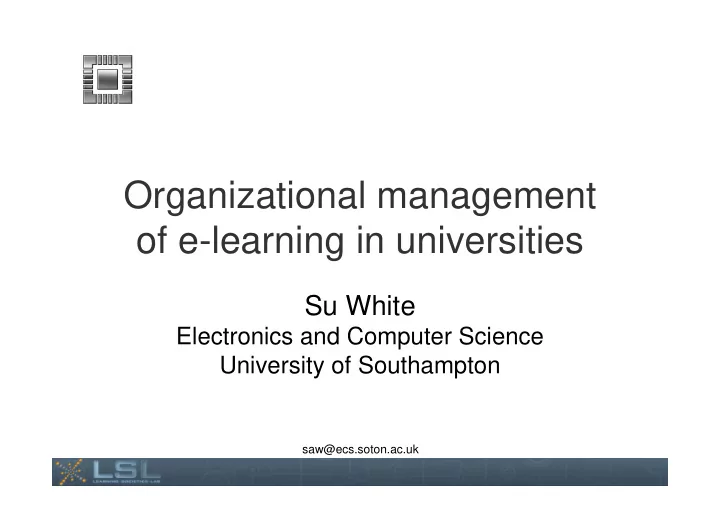

Organizational management of e-learning in universities Su White Electronics and Computer Science University of Southampton saw@ecs.soton.ac.uk
Organizational management of e-learning in universities Techno-centric view Socio-technic view • Produce another tool • Produce another tool • Get a publication • Get a publication • If it doesn’t work with • If it doesn’t work with students students • “That’s not my problem • Try to figure out why.. its research” Some people “don’t really care for this sort of research” saw@ecs.soton.ac.uk
Approach: Two Phases Phase 1 Phase 2 Single Institution Six Institutions 3 surveys over 10 years Qualitative: Follow on – in depth enquiry • Questionnaire • Chain Sampling • Quantitative • Understanding of why e- • Qualitative learning succeeded/ • Staff attitudes to computers floundered in teaching • Actors throughout the – Experience process – Use & Beliefs • Senior managers-> learning technologists There was technological advance but it was limited by organizational constraints saw@ecs.soton.ac.uk
Adapted from McNay Collegial Academy to Corporate Enterprise: the changing culture of universities saw@ecs.soton.ac.uk
Geoghegan Early majority • like gradual change Taking technology into the mainstream • pragmatic • process oriented • risk averse • need support • self sufficient • relate vertically Early Adopters • like radical change • visionary • project oriented • risk takers • experimenters • self sufficient • relate horizontally Research Question: Do different preferences predominate in different institution types? saw@ecs.soton.ac.uk
Question Structure Allegiance, self image, income, University type aspirations Organizational type Collegial, enterprise, bureacratic, corporate Strategies and Policies E-learning platforms, student Implemented Technologies management tools, technology infrastructure Cross institutional management, Organizational Structure roles and responsibilities saw@ecs.soton.ac.uk
Institutions: broad types, values and behaviours Research Local income links Financial Financial autonomy constraints Professional Pragmatic Research Teaching values values Intensive Intensive Poor but Laissez solvent faire Devolved Centralised management management Managers’ perceived context and stated approaches compared saw@ecs.soton.ac.uk
Typical institutional tensions Teaching Research Funding finance planning and investment efficiency and innovation Social Accountability Diversity Outcome managing up and effectiveness negotiating collaboration objectives and participation Quality Income Generation saw@ecs.soton.ac.uk
Is this why projects fail? saw@ecs.soton.ac.uk
Some conclusions • Small projects and research will demonstrate behaviours of early adopters • Institution wide projects will need to address needs of early majority • Research intensive institutions we have a predominant culture of the early adopters • Understanding differences can help us make management decisions – Institution-wide e-learning projects requires a different approach to small scale research experiments – Different sorts of projects can be expected to succeed and fail in different ways – Understanding institution types can direct us towards selecting appropriate interventions saw@ecs.soton.ac.uk
references Bailey, P., Technology Supported Learning: Attitudes to Technology in Teaching, Learning and Assessment University of Plymouth, Plymouth, UK (1996) Barnett, L., Maier, P., Hothi, J., Reviewing IT Use for Teaching and Other Purposes at the University of Southampton. Internal Report. University of Southampton (1998) Damanpour, F., Organizational Innovation: A Meta-Analysis of Effects of Determinants and Moderators. The Academy of Management Journal 34: 3 (1991) 555-590 Doughty, G., Using Learning Technologies: Interim Conclusions from the Tilt Project. University of Glasgow, Glasgow (1994) Geoghegan, W.H., Whatever Happened to Instructional Technology? In: Bapna, S., Emdad, A., Zaveri, J. (eds.): 22nd Annual Conference of the International InstrcIBusiness Schools Computing Association (IBSCA). IBM, Baltimore, Maryland (1994) 438-447 Geoghegan, W.H., Instructional Technology and the Mainstream: The Risks of Success. In: Oblinger, D.G., Rush, S.C. (eds.): The Future Compatible Campus: Planning Designing and Implementing Information Technology in the Academy. Anker, Bolton, Mass (1998) 131-150 Hall, W., Hutchings, G., White, S., Breaking Down the Barriers: An Architecture for Developing and Delivering Resource Based Learning Materials. World Conference on Computers in Education, Birmingham, UK (1995) [McNay, I., From Collegial Academy to the Corporate Enterprise: The Changing Cultures of Universities. In: Schuller, T. (ed.): The Changing University? Open University/SRHE, Buckingham (199 Moore, G., Crossing the Chasm : Marketing and Selling Technology Products to Mainstream Customers . Harper Business, New York (1991) Morrison, D., Mayes, T., Gulc, E., Benchmarking E-Learning in UK Higher Education. In: Markauskaite, L., Goodyear, P., Reimann, P. (eds.): The 23rd Annual Conference of the Australasian Society for Computers in Learning in Tertiary Education: Who’s learning? Whose technology? Sydney University Press, Sydney (2006) 583-587 White, S., Scolar - a Campus Wide Structure for Multimedia Learning. AETT Annual Conference: Designing for Learning. Kogan Page, University of Strathclyde, Glasgow (1993) White, S.A., Higher Education and Learning Technologies: An Organisational Perspective. Electronics and Computer Science, Vol. PhD. University of Southampton, Southampton, UK (2006) White, S.A., Critical Success Factors for Institutional Change: Some Organizational Perspectives. In: Davis, H.C., Eales, S. (eds.): Critical Success Factors for Institutional Change, a workshop of the European conference of saw@ecs.soton.ac.uk Digital Libraries, (ECDL’06). University of Southampton, Alicante (2006) 75-89
Recommend
More recommend